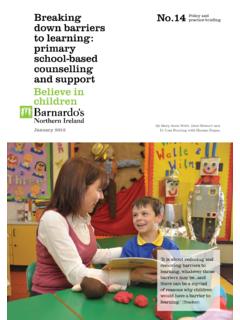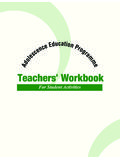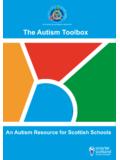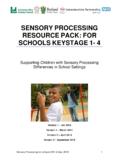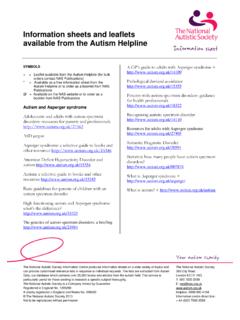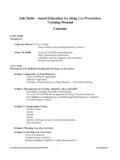Transcription of Pastoral Periodical One
1 1 2 Dear All, Welcome to the first edition of Pastoral Periodical : Different Settings, Different Perspectives. Here, at UK Pastoral Chat, we connect with many professionals who work tirelessly in education to make a difference to the lives of our young people, we witness a lot of great practice, we hear a lot of thought-provoking ideas underpinned by passion and genuine care. We hope that the Pastoral Periodical will capture and convey this knowledge and enthusiasm to our readers. We believe that when we work with children, we become Pastoral leaders by default; we deal with pupils problems and anxieties in our academic lessons, in registrations, at lunch times on the playground. We hope that no matter what post you hold in your workplace, you will find something that will be of interest, something that will help you to keep on developing as a Pastoral leader, and something that will challenge your thinking.
2 We are very grateful to every single one of our contributors, who found time in their busy schedules to share their expertise with us. Without you, this Periodical wouldn t have been possible. We are also grateful to all of you for downloading our first issue. Thank you for your support, we hope to continue working together in future. Warm wishes, Maria O Neill Founder UK Pastoral Chat It s Our Nature to Nurture. 3 CONTENTS. Jules Daulby A Pastoral system underpins inclusion. Mike Armiger What a PRU has taught me about Pastoral care? Jill Berry The Joys and Challenges of Supporting Girls Andrew Hampton Helping girls at school be happy in their friendships Kay Price Promoting Well-being in Boarding Jonathan Akhurst Man Up?
3 Julie Hunter How would you plan Pastoral provision if you had a blank piece of paper to dream big? Vic Goddard Pastoral Care at Passmores. Mary Myatt Gratitude Simon Feasey Billys Count: the kindness of connected communities Allana Gay Respecting cultural norms within Pastoral care Stephen Tierney Is Attendance the A1 Priority of Pastoral Care? Natasha Devon What Pastoral Care Would Look Like if I was Queen of Everything 4 A Pastoral system underpins inclusion. _____ Jules Daulby Most discussions on inclusion start with teaching in the classroom . What strategies can be used? Differentiation. How can learners with SEND access the curriculum and record their knowledge. Even behaviour strategies concentrate on classroom techniques and usually end up exploring issues such as disruption.
4 Pastoral care however is a vital part of the inclusion toolkit, in both primary and secondary settings. They may look different in how they are achieved but the concept is the same. The person who primarily knows and cares for a child is usually the first to detect when things are going wrong. This classroom teacher, tutor or key worker can often make or break a partnership with parents as well as the link between Pastoral care and academic rigour. The communication channel in Pastoral roles glues together parent, child and curriculum. This is important for all children but for the child with SEND, it is doubly powerful and may even prevent exclusions (children with SEND account for more than half of all permanent and fixed term exclusions). A Pastoral system responsive to the pupil is a friend to the child and family with additional needs.
5 This can often be supported by the SENCO but it is the Pastoral point which should be central and the SEN expertise feeding that system rather than the other way round. Where possible, if the Pastoral port of call can come to meetings about the child, an annual review for instance, it can be extremely effective as they give information that a SENCO or subject teacher, even a TA cannot give. How do they socialise with peers? Do they volunteer for quizzes? Who are their friends and when might they become anxious? A recognition of Pastoral power should be a vital ingredient in SEND support, I wonder how much this is mentioned in school improvement plans, training sessions for staff and in secondary, the magical role of tutor? 5 Some SEND tips for Pastoral care: Know the child s additional needs and find links when you communicate with parents and teachers Monitor punishments such as detentions and staying in at playtime are they fair?
6 Are any behaviours triggered by a need the child has which is not being met? Join the dots you can often triangulate issues between various parties and, like a detective, work out the solution Listen to the parents they are the experts in their child and have often had more training in the SEN their child has due to continuous meetings with professionals such as paediatricians You are often a non-threatening contact point for parents and children and this can be extremely useful Know your power as the kind, consistent and firm champion for the child. They will never forget you for it and in twenty years time may still be the teacher they remember most that s a privilege and one of the best things about being the pivotal, Pastoral point for a child. Jules Daulby Jules Daulby is Director of Education for The Driver Youth Trust.
7 She has over twenty years experience in teaching and specialises in literacy, SEND and whole school systems. Jules is committed to a comprehensive and inclusive education for all children. She is also a national leader for #WomenEd and writes for various publications such as the TES, Schools Weekly and InnovateMySchool. 6 What a PRU has taught me about Pastoral care? _____ Mike Armiger If you were to ever step foot in one of my lessons you would discover two things; One, I love a posh biscuit and Two, I talk about emotions all the time. In most alternative provision s I have worked in, Pastoral care is not something that runs separately to teaching and learning, it s at the core of everything the provision does. It s important to understand that in many alternative provisions, the standardised ways of running interventions and supporting mental health do not always apply.
8 I have always found Pru s to be quite magical places for support. Despite the challenges of the system they are packed with adults who have the ability to support young people in a number of ways. Young people arrive in alternative provision with labels attached to them. When I say labels I don t mean in terms of additional needs, I mean labels that have been placed on them, that they have often met for many complex reasons. I meet many young people all the time who tell me that they are angry. Often these young people have gone through systems and anger management interventions, unable to self-regulate healthily, and so this label becomes re enforced everywhere they look. Now I m not saying that there is not an anger problem there because occasionally there is, but it s quite apparent that not many have spoken about other vulnerability triggering emotions.
9 Frustration? Rarely spoken about. Anxiety? Believed to be only shaking and withdrawal. Overwhelm? Never heard of it. Emotional literacy in alternative provisions is so important because there are so many young people with complex experiences. Feeling These are used to help young people effectively label their emotions and indicate to adults where their students are feeling when they arrive in the morning. They benefit some young people for sure and give adults an insight into young people s lives that evening, weekend etc. I had always been quite sceptical of this idea, because I wasn t sure that many of my students could actually access them properly. But I remember standing on the door one day and thinking to myself Why on earth are we only 7 allowing them to pick one emotion? . I couldn t understand why we had only emphasised one emotion when we know that we don t always feel emotions singularly.
10 Also it meant that there was a possibility of our students living up to this label throughout the day. So we developed this and sued it more than once a day so our students understood that this wasn t a fixed state & that it was possible to feel more than one emotion. Over the course of the next few weeks we saw huge changes in terms of young people thinking critically about their emotions. It now wasn t about deciding what emotion they felt, we were now encouraging curiosity not instant decision making. With this in mind, let s now take the fact that often many of my students are unable to articulate their feelings and struggle to regulate the stress they feel in their bodies. I often think we take our ability to sit in a room and articulate our emotions and thoughts for granted. This is where Pastoral care and interventions must evolve.
